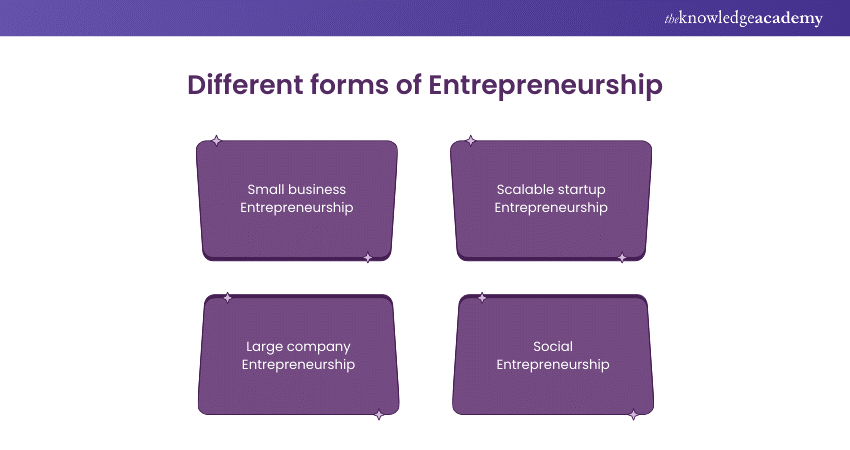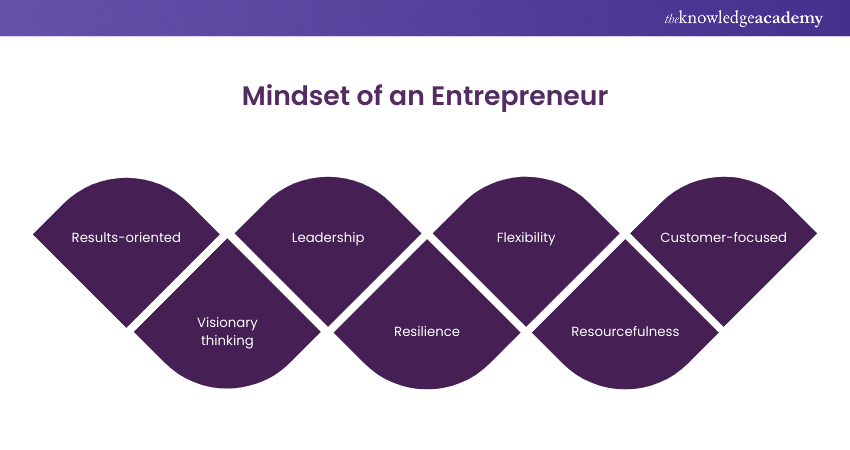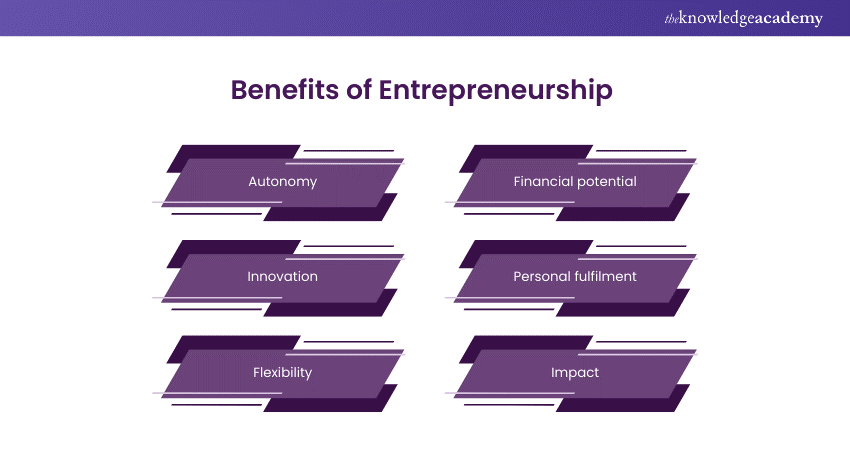We may not have the course you’re looking for. If you enquire or give us a call on 01344 203999 and speak to our training experts, we may still be able to help with your training requirements.
Training Outcomes Within Your Budget!
We ensure quality, budget-alignment, and timely delivery by our expert instructors.

For the question – What is Entrepreneurship, you can find a fitted answer. It is the driving force behind innovation, a crucial catalyst for economic growth, and a reflection of the human spirit's relentless pursuit of progress. In a world where change is the only constant, entrepreneurs stand at the forefront, transforming ideas into reality, obstacles into opportunities, and visions into achievements.
It is more than merely starting a business; it is a mindset, a way of thinking, and a continuous quest to create value. In this blog, we cover the core of Entrepreneurship, examine its various types, significance, and understand the mindset that powers this entrepreneurial drive. Let's dive in and understand What is Entrepreneurship
Table of Contents
1) What is Entrepreneurship?
2) Different forms of Entrepreneurship
3) The importance of Entrepreneurship
4) What is the mindset of Entrepreneur?
5) Entrepreneurship's benefits and drawbacks
6) Conclusion
What is Entrepreneurship?
Entrepreneurship involves starting, operating, and expanding a business to earn profits while taking on considerable financial risk. It involves identifying market opportunities, devising innovative solutions, and pursuing these opportunities despite challenges and uncertainties.
Entrepreneurs are important in driving economic growth, introducing new products and services, and often inspiring change within their industries and communities. This field blends creativity, strategic planning, and leadership to transform ideas into tangible businesses.
Different forms of Entrepreneurship
Entrepreneurship comes in various shapes and sizes, catering to different aspirations and goals:

Small business Entrepreneurship
Small business Entrepreneurship is the establishment of small business ventures mainly engaged in traditional sectors such as retail, services, and local manufacturing. Here, businesses tend to emphasise their commitment to the community and developing loyal customers.
Scalable startup Entrepreneurship
Scalable Startups Entrepreneurship is defined as the establishment of startups aiming at quick growth and big market influence. These businesses, which have innovative ideas to compete with existing markets or create new ones, sometimes use venture capital as their source of funding.
Large company Entrepreneurship
Large firm Entrepreneurship, also known as intrapreneurship, is about instilling entrepreneurial spirit in the already existing big companies. The primary objective is to promote innovation, create new products, and discover previously unexplored markets to be always ahead of the competition.
Social Entrepreneurship
Social Entrepreneurship aims to solve social or environmental problems. It links profitability with the purpose of helping society. Social entrepreneurs create separate business models to solve various problems, from poverty to environmental degradation, perpetuating sustainable solutions.
The importance of Entrepreneurship
Entrepreneurship is a powerful engine that fuels economic growth, sparks innovation, and opens up new job opportunities. It injects a competitive spirit into the market, elevates productivity, and contributes to the overall prosperity by launching new products, services, and business models. Entrepreneurs are often at the forefront of economic change, shaping industries and transforming societies.
What is the mindset of Entrepreneur?
Entrepreneurs have specific traits and characteristics that ultimately lead to their success. Here are some of the mindsets of them:

a) Results-oriented: They continuously laser-focus on materialising tangible milestones and quantifiable achievements, as they remain vigilant while pursuing their goals.
b) Visionary thinking: Visionaries, by nature, have the ability to foresee future trends. They can identify growth opportunities that others may perceive as challenges, always being one step ahead.
c) Leadership: Armed with people leadership skills, they become more than just managers: they inspire and unite their teams, forging a culture of team spirit and a shared purpose.
d) Resilience: The real entrepreneurial spirit consists of regaining strength after a defeat with energy, passion, and self-confidence. They are the underdogs of the business world.
e) Flexibility: They are flexible and quick-thinking, always prepared to face unforeseen situations or change the pace in an unplanned way.
f) Resourcefulness: Mastery in the art of making something out of nothing is what a true entrepreneur knows and maximises the value from resource constraints as a professional.
g) Customer-focused: Their compass always points towards customer satisfaction, ensuring they meet needs, deliver value, and build unwavering loyalty.
Enhance your relationship-building skills with our Building Business Relationships Course – join today!
Entrepreneurship's benefits and drawbacks
Entrepreneurship is a journey of various possibilities and underlying constraints. On the one hand, it brings freedom of innovation and opportunity for huge rewards, but on the other hand, it is accompanied by risks and responsibilities that require due diligence. Let’s explore both the aspects below:
Benefits of Entrepreneurship
Here are the benefits:

a) Autonomy: Entrepreneurs are provided with a liberty to undertake various decisions, particularly strategic, and to run the business in accordance with their own vision.
b) Financial potential: Successful entrepreneurship might come with big financial gains in the end and chances for achieving significant personal wealth.
c) Innovation: Entrepreneurs often introduce new and successful products or solutions into the market, which in turn creates progress and technological advancement.
d) Personal fulfilment: The peaks of happiness are really high when you actually see a result of your imagination, and it works out well in reality.
e) Flexibility: Entrepreneurs have the power to plan their own schedules, and this is something that might help them achieve a better work-life balance.
f) Impact: Entrepreneurs are a boon to the communities and economy as they generate jobs and set up businesses.
Drawbacks of Entrepreneurship
Here are the disadvantages:
a) Financial risk: Starting a business involves significant financial risk, including the potential loss of initial investments.
b) Uncertainty: Entrepreneurial ventures face high levels of uncertainty and instability, especially in their early stages.
c) Workload: Entrepreneurs often experience long working hours and high stress, especially as they strive to establish and grow their businesses.
d) Isolation: Running a business can sometimes be a lonely journey, particularly without the support structure typically found in larger organisations.
e) Responsibility: Entrepreneurs carry a heavy load of responsibility for the success of their business, the well-being of their employees, and customer satisfaction.
f) Work-life balance: Despite the potential for flexible schedules, maintaining a work-life balance can be difficult due to the demanding nature of Entrepreneurship.
Boost your workplace efficiency with our Organisational Skills Course – join today!
Conclusion
Entrepreneurship is about making things happen. Whether it's starting a small shop or launching a big company, it's all about seeing opportunities and turning them into reality. It is about finding new ways to solve problems and improve people's lives. So, “What is Entrepreneurship?” It's about having big ideas and the courage to chase them. As we keep exploring this exciting world, let's remember that anyone can be an entrepreneur if they're willing to work hard and dream big.
Understand how to manage Entrepreneurial risk with our Entrepreneurship Course – join today!
Frequently Asked Questions

To begin your entrepreneurial journey, start by identifying a compelling business idea and then conduct market research to understand potential customers and competitors. Follow this with a solid business plan that outlines your strategy for operations, marketing, and financial projections.

Entrepreneurs manage risk by thoroughly researching and planning to understand and mitigate potential pitfalls in their market. Additionally, diversifying their product offerings, maintaining a financial safety net, and securing appropriate insurance help protect against unforeseen challenges.

The Knowledge Academy takes global learning to new heights, offering over 30,000 online courses across 490+ locations in 220 countries. This expansive reach ensures accessibility and convenience for learners worldwide.
Alongside our diverse Online Course Catalogue, encompassing 17 major categories, we go the extra mile by providing a plethora of free educational Online Resources like News updates, Blogs, videos, webinars, and interview questions. Tailoring learning experiences further, professionals can maximise value with customisable Course Bundles of TKA.

The Knowledge Academy’s Knowledge Pass, a prepaid voucher, adds another layer of flexibility, allowing course bookings over a 12-month period. Join us on a journey where education knows no bounds.

The Knowledge Academy offers various Personal Development Courses including Entrepreneurship Course, Organisational Skills Course and Building Business Relationships Course. These courses cater to different skill levels, providing comprehensive insights into the Resource Planning Template.
Our Business Skills Blogs cover a range of topics related to Entrepreneurship, offering valuable resources, best practices, and industry insights. Whether you are a beginner or looking to advance your Entrepreneur skills, The Knowledge Academy's diverse courses and informative blogs have you covered.
Upcoming Business Skills Resources Batches & Dates
Date
 Entrepreneurship Course
Entrepreneurship Course
Fri 17th Jan 2025
Fri 21st Mar 2025
Fri 16th May 2025
Fri 18th Jul 2025
Fri 19th Sep 2025
Fri 21st Nov 2025







 Top Rated Course
Top Rated Course



 If you wish to make any changes to your course, please
If you wish to make any changes to your course, please


